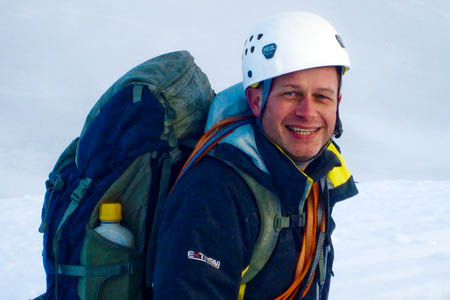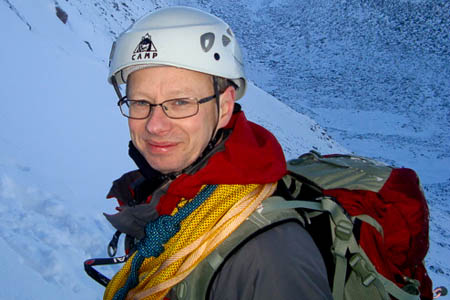The families of two of the men killed in the Mont Maudit avalanche have spoken of their loss in tributes to the climbers.
Steve Barber’s long-term partner Donna Rogers revealed his attempt on the Mont Blanc summit was a long-time ambition.
The 47-year-old lived on the same street in Upper Poppleton, York, as John Taylor, 48, who also perished in the incident 4,000m up on the Alpine mountain early yesterday.
Mr Taylor had summited Mont Blanc twice previously.
The men were using their attempt on western Europe’s highest mountain to raise cash for a local hospice.
They died along with Mountain Guide Roger Payne, a well-respected mountaineer and avalanche expert, who was formerly general secretary of the British Mountaineering Council.
Ms Rogers said: “As might be expected, the family and I are all devastated at the loss of Steve and his close friend John.
“Steve has lived in Poppleton most of his life. His parents ran the village Post Office before retiring several years ago.
“Steve, like John, loved the outdoors and was a keen walker. He always wanted to climb Mont Blanc, an ambition that this trip was to fulfil.
“He had been training hard for the ascent and had successfully completed several challenging climbs in Europe and in the UK prior to this trip.
“In his personal life, Steve was a company finance accountant with a Leeds-based finance company.
“The family wishes to express their sincere thanks to the men and women of the mountain rescue teams who tried so hard to save John and Steve.
“The family also wishes to thank friends and close family who have been so supportive at this time.
“They would also like to thank the Foreign and Commonwealth Office for the assistance offered and provided at this time.”
Mr Barber leaves Ms Rogers and their daughter Francesca, 10, his parents and sister Julie.
Mr Taylor, originally from Manchester, moved to Poppleton in 2003. He leaves behind his wife Karine and his two daughters, Emma, 10, and Louise, eight.
Mrs Taylor said: “We are all truly devastated about this loss.
“John always had a keen interest in outdoor activities taking up mountaineering in 1998 and was a highly regarded and very active member of mountain rescue teams himself.
“John had climbed several challenging mountains across the world, including Mont Blanc on two previous occasions.
“He was a highly respected climber and this event represents a significant loss to the UK climbing community.
“In his personal life, John was a finance director, working within the public and private sectors.
“He will be sadly missed by his work colleagues.
“The family would like to pay tribute to the mountain rescue teams based in France and elsewhere that tried to save John and his good friend Steve.”
She too thanked the Foreign Office for its help.
The Search and Rescue Dogs Association England added: “It is with great sadness that we have learned about the passing of John Taylor who was tragically killed in the avalanche on Mont Maudit.”
Sarda England said Mr Taylor was a Dogsbody with the charity – one of the group of people who act as casualties during training, often sitting out on mountains for hours on end in all weathers waiting to be found by the search dogs.
A spokesperson added: “John was a volunteer Dogsbody with Sarda England and helped many dogs and handlers make the grade. In his time with us John made many friends, and will be sadly missed.
“We would like to offer our deepest condolences to his family and friends at this sad time.
“Our thoughts are not only with his family and friends, but also with the relatives and friends of all who have lost loved ones in this tragic event.
“As fellow mountain rescuers we can’t help but turn our thoughts also to the men and women of the French mountain rescue service. Ours is a difficult task which is made harder when life is lost.”
- The Union Internationale des Associations d’Alpinisme, the international mountaineering and climbing federation, paid tribute to Roger Payne, one of its key activists.
Jordi Colomer, acting president of the UIAA, said: “It’s very sad news and on behalf of the mountaineering community, our sincerest condolences to his family and BMC friends.”
Bob Pettigrew, former BMC president and immediate past president of the UIAA access and conservation commission said Mr Payne ‘was an esteemed exploratory mountaineer particularly in Nepal and Bhutan Himalaya where he made a number of outstanding first ascents’.
“He was also a gifted administrator in his roles at the BMC and the UIAA,” Mr Pettigrew, a life-long friend of Mr Payne added.
He described the 55-year-old climber as an imaginative and innovative director responsible for a wide range of initiatives, particularly the National Mountaineering Museum at Rheged and the Mountain Heritage Trust.
Anne Arran, president of the UIAA youth commission said Mr Payne left a lasting legacy in the climbing world and his enthusiasm drew people together to support projects he found interesting whether they be youth, access, training or others.
“The title UIAA Global Youth Summit was of his making as was the BMC’s Summit magazine and several other initiatives,” she said.
“He wore multiple hats of climber, bureaucrat and innovator.”
He was sports and development director at the UIAA where he was an active member and involved in a wide range of initiatives.
He came to the UIAA under the presidency of Ian McNaught-Davis where he become development director and chief lieutenant to Alan Blackshaw, the esteemed mountaineer and diplomat who succeeded McNaught-Davis.
At the UIAA, he was an architect of the UIAA development plan and an advocate for greater UIAA involvement in India and China. He was also actively involved in helping ski-mountaineering and ice-climbing competitions become a part of UIAA.
Other areas at the UIAA where Mr Payne left his mark included an agreement on an international scale for avalanche hazards, model instructor training standards and the application for ski-mountaineering to be considered for the Winter Olympics.
He also worked with the Aga Khan Rural Support Programme, the United Nations Environment Programme, the World Conservation Union and the World Commission for Protected Areas, and his projects included increasing benefits to local communities from tourism, raising awareness about the impact of climate change in the Himalaya and promoting mountain peace parks and end to the Siachen Glacier conflict on the border of India and Pakistan.
Mr Payne is survived by his wife Julie-Ann Clyma and mother Nellie.

